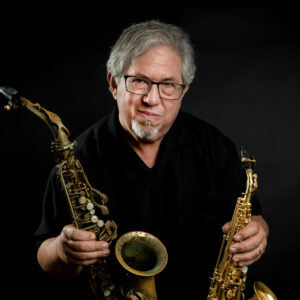New York Rising
New Hudson Saxophone Quartet
Paul Cohen soprano saxophone
David Demsey tenor saxophone
Avi Goldrosen alto saxophone
Tim Ruedeman baritone saxophone
Joseph Trapanese composer
Aaron Copland composer
Robert Sirota composer
Percy Grainger composer
David Noon composer
Christopher Brellochs alto saxophone
Ulrich Krieger alto saxophone
Paul Cohen and The New Hudson Saxophone Quartet return to Ravello Records with NEW YORK RISING. Showcasing their well-blended sound and ability to turn on a stylistic dime, the ensemble navigates works by several American composers, from the title track’s evocations of a young man’s excitement, curiosity, and determination in the Big Apple to arrangements of Aaron Copland’s Suite from Our Town and Simple Gifts, and more. The ensemble is joined by guest artists Christopher Brellochs and Ulrich Krieger, both alto saxophonists, throughout the program.
Listen
Stream/Buy
Choose your platform
Track Listing & Credits
| # | Title | Composer | Performer | |
|---|---|---|---|---|
| 01 | New York Rising (2003): Prelude | Joseph Trapanese | New Hudson Saxophone Quartet | Paul Cohen, soprano saxophone; David Demsey, tenor saxophone; Avi Goldrosen, alto saxophone; Tim Ruedeman, baritone saxophone | 3:46 |
| 02 | New York Rising (2003): Chorale | Joseph Trapanese | New Hudson Saxophone Quartet | Paul Cohen, soprano saxophone; David Demsey, tenor saxophone; Avi Goldrosen, alto saxophone; Tim Ruedeman, baritone saxophone | 3:25 |
| 03 | New York Rising (2003): Fugue | Joseph Trapanese | New Hudson Saxophone Quartet | Paul Cohen, soprano saxophone; David Demsey, tenor saxophone; Avi Goldrosen, alto saxophone; Tim Ruedeman, baritone saxophone | 2:04 |
| 04 | Suite from Our Town (1939): The Story of Our Town | Aaron Copland, arr. Paul Cohen | New Hudson Saxophone Quartet | Paul Cohen, soprano saxophone; David Demsey, tenor saxophone; Avi Goldrosen, alto saxophone; Tim Ruedeman, baritone saxophone | 2:52 |
| 05 | Suite from Our Town (1939): Conversation at the Soda Fountain | Aaron Copland, arr. Paul Cohen | New Hudson Saxophone Quartet | Paul Cohen, soprano saxophone; David Demsey, tenor saxophone; Avi Goldrosen, alto saxophone; Tim Ruedeman, baritone saxophone | 2:15 |
| 06 | Suite from Our Town (1939): The Resting-place on the Hill | Aaron Copland, arr. Paul Cohen | New Hudson Saxophone Quartet | Paul Cohen, soprano saxophone; David Demsey, tenor saxophone; Avi Goldrosen, alto saxophone; Tim Ruedeman, baritone saxophone | 3:04 |
| 07 | Diners (2009): Road Trip | Robert Sirota | New Hudson Saxophone Quartet | Paul Cohen, soprano saxophone; David Demsey, tenor saxophone; Avi Goldrosen, alto saxophone; Tim Ruedeman, baritone saxophone | 2:04 |
| 08 | Diners (2009): Breakfast at the Miss Florence, Northhampton, Massachusetts | Robert Sirota | New Hudson Saxophone Quartet | Paul Cohen, soprano saxophone; David Demsey, tenor saxophone; Avi Goldrosen, alto saxophone; Tim Ruedeman, baritone saxophone | 2:32 |
| 09 | Diners (2009): Neon | Robert Sirota | New Hudson Saxophone Quartet | Paul Cohen, soprano saxophone; David Demsey, tenor saxophone; Avi Goldrosen, alto saxophone; Tim Ruedeman, baritone saxophone | 1:11 |
| 10 | Diners (2009): Lunch at Moody's, Waldoboro, Maine | Robert Sirota | New Hudson Saxophone Quartet | Paul Cohen, soprano saxophone; David Demsey, tenor saxophone; Avi Goldrosen, alto saxophone; Tim Ruedeman, baritone saxophone | 6:03 |
| 11 | Diners (2009): taking the N train to Dinner at the Neptune, Astoria, Queens | Robert Sirota | New Hudson Saxophone Quartet | Paul Cohen, soprano saxophone; David Demsey, tenor saxophone; Avi Goldrosen, alto saxophone; Tim Ruedeman, baritone saxophone | 3:05 |
| 12 | Lisbon (1943) | Percy Grainger | Ulrich Krieger, alto saxophone; New Hudson Saxophone Quartet | Paul Cohen, soprano saxophone; David Demsey, tenor saxophone; Avi Goldrosen, alto saxophone; Tim Ruedeman, baritone saxophone | 1:22 |
| 13 | Saxophone Quartet #1 (2001): Allegro | David Noon | Christopher Brellochs, alto saxophone; New Hudson Saxophone Quartet | Paul Cohen, soprano saxophone; David Demsey, tenor saxophone; Avi Goldrosen, alto saxophone; Tim Ruedeman, baritone saxophone | 4:00 |
| 14 | Saxophone Quartet #1 (2001): Variazioni | David Noon | Christopher Brellochs, alto saxophone; New Hudson Saxophone Quartet | Paul Cohen, soprano saxophone; David Demsey, tenor saxophone; Avi Goldrosen, alto saxophone; Tim Ruedeman, baritone saxophone | 8:22 |
| 15 | Saxophone Quartet #1 (2001): Fugue | David Noon | Christopher Brellochs, alto saxophone; New Hudson Saxophone Quartet | Paul Cohen, soprano saxophone; David Demsey, tenor saxophone; Avi Goldrosen, alto saxophone; Tim Ruedeman, baritone saxophone | 4:06 |
| 16 | Simple Gifts (1939) | Aaron Copland, arr. Paul Cohen | New Hudson Saxophone Quartet | Paul Cohen, soprano saxophone; David Demsey, tenor saxophone; Avi Goldrosen, alto saxophone; Tim Ruedeman, baritone saxophone | 3:26 |
Paul Cohen plays a 1925 Buescher curved soprano on this recording, with a Caravan mouthpiece and D’Addario #3.5 reeds. Avi Goldrosen (alto), David Demsey (tenor) and Tim Ruedeman play alto and tenor Caravan and Bilger baritone mouthpieces, with D’Addario 3.5-4 reeds.
Session Producer Paul Cohen
Tracks 1-6, 12 & 16
Recorded in 2005 at Town Hall in New York City NY
Session Engineer David Miller
Tracks 7-11
Recorded in 2014 at Oktaven Audio in Yonkers NY
Session Engineer Ryan Streber
Tracks 13-15
Recorded in 2017 at LeFrak Hall, Queens College in Queens NY
Session Engineer Joseph Patrych
Mastering Chris Sulit
Executive Producer Bob Lord
A&R Director Brandon MacNeil
A&R Jeff Leroy
VP of Production Jan Košulič
Audio Director Lucas Paquette
VP, Design & Marketing Brett Picknell
Art Director Ryan Harrison
Publicity Chelsea Kornago
Digital Marketing Manager Brett Iannucci
Artist Information

New Hudson Saxophone Quartet
The New Hudson Saxophone Quartet is a rare combination: an ensemble dedicated to presenting American music with a string quartet approach and a beautiful, blending instrumental sound. Their repertoire can range from commissioned works by Robert Sirota and David Noon to classic original repertoire by 19th-century American composers Caryl Florio and the 20th century Alec Wilder.

Paul Cohen
Paul Cohen is a sought-after saxophonist for orchestral and chamber concerts and solo recitals. He has appeared as soloist with the San Francisco Symphony, Richmond Symphony, New Jersey Symphony, Charleston Symphony, and the Philharmonia Virtuosi. His many solo orchestra performances include works by Debussy, Creston, Ibert, Glazunov, Martin, Loeffler, Husa, Dahl, Still, Villa-Lobos, Tomasi, and Cowell. He has also performed with a broad range of orchestras, including the New York Philharmonic, Metropolitan Opera (NYC), American Symphony Orchestra, Cleveland Orchestra, Santa Fe Opera, New Jersey Symphony, Oregon Symphony, San Diego Symphony, Long Island Philharmonic, Group for Contemporary Music, Greenwich Symphony, and New York Solisti.

Joseph Trapanese
Joseph Trapanese (b. 1984) is best known for his score work for blockbuster films like Tron: Legacy, Straight Outta Compton, The Greatest Showman, Oblivion and the Raid series. As a composer, arranger, and producer for movie, television, cheater, and video game music, he has collaborated with a number of mainstream musical acts such as Daft Punk, M83, Mike Shinoda, and Dr. Dre. Solo work includes films such as Stuber, Arctic, Robin Hood, Only The Brave, Earth to Echo, and two installments of the Divergent series.

Robert Sirota
Over four decades, composer Robert Sirota (b. 1949) has developed a distinctive voice, clearly discernible in all of his work — whether symphonic, choral, stage, or chamber music. Writing in the Portland Press Herald, Allan Kozinn asserts: “Sirota’s musical language is personal and undogmatic, in the sense that instead of aligning himself with any of the competing contemporary styles, he follows his own internal musical compass.”

David Noon
David Noon was born of Pennsylvania Dutch, Welsh, and American Indian heritage in Johnstown PA on July 23, 1946. His formal musical education began at the age of 8 when he learned to play clarinet. Subsequently, he took bassoon, flute, piccolo, and piano lessons. Throughout his childhood, he frequently performed in choirs, bands, orchestras, and chamber music ensembles. During his collegiate years at Pomona College, he continued to sing and play bassoon and piano. He also began the systematic study of composition. His composition teachers have included Karl Kohn, Darius Milhaud, Charles Jones, Yehudi Wyner, Mario Davidovsky, and Wlodzimierz Kotonski.
David Demsey
David Demsey is Professor of Music and Coordinator of Jazz Studies at William Paterson University. He has performed with the New York Philharmonic since 1995, including three world tours as well as the Metropolitan Opera conducted by James Levine, and with the Kirov Orchestra led by Valery Gergiev. As a jazz performer, he has been a member of the Water Gap Jazz Orchestra directed by Phil Woods since 2014, and has appeared with such diverse artists as trumpeters Clark Terry and Randy Brecker, bassists Milt Hinton and Rufus Reid, pianists Mulgrew Miller, James Williams, and Jim McNeely. His article Improvisation and Concepts of Virtuosity is the final essay in the Oxford Companion to Jazz. He published the transcription book John Coltrane Plays “Giant Steps” (Hal Leonard), and has written two books on composer Alec Wilder. He was a Contributing Editor for Saxophone Journal and Jazz Player magazines, and is a Selmer Saxophone Clinician.
Avi Goldrosen
Avi Goldrosen performs with several orchestras in the NYC region, including the Plainfield Symphony, Long Island Philharmonic, Livingston, Charleston Symphony, New Jersey Pops, Rutgers, and Juilliard Orchestras, and has performed under the conductors Lawrence Leighton Smith, Richard Auldon Clark, Sabin Pautza, Mark Gould, David Briskin, and Randell Behr. Goldrosen’s chamber music playing includes performances with the New Juilliard Ensemble, New Jersey Saxophone Ensemble, and recent tours with the New York Theater Ballet. Goldrosen performs regularly with the Saxophone Sinfonia, and is a member of the Garden State Symphonic Band.
Tim Ruedeman
Saxophonist Tim Ruedeman, praised for his “elegant and pure sound” (Saxophone Journal) and noted as “versatile and virtuosic” (Philadelphia Inquirer), has performed with the New York Philharmonic, Charleston Symphony, Manhattan Chamber Orchestra, Bridgeport Symphony, Long Island Philharmonic, Mostly Mozart Festival, Lincoln Center Festival, International Contemporary Ensemble (I.C.E.), Absolute Ensemble, and is a founding member of Flexible Music and the New Hudson Saxophone Quartet. He has appeared as soloist with the New York Philharmonic CONTACT!, Greenwich Symphony, Manhattan Chamber Orchestra, S.E.M. Ensemble, soundScape festival (Italy), and Hanover Winds. An active jazz and commercial player, he has toured and recorded with Tony Bennett, David Foster, Diana Krall, Rostam of Vampire Weekend, the Walkmen, Paul Shaffer, Christopher Cross and appeared on Late Show with David Letterman, Live with Michael and Kelly, and Good Morning America. Ruedeman serves on the faculty of NYU, C.U.N.Y. Queens, and William Paterson University, and holds a B.M. from Oberlin and an M.M. and Ph.D. from NYU.
Christopher Brellochs
Christopher Brellochs has performed everywhere from Carnegie Hall in New York City to Saint Merri in Paris, France. He performs with orchestras, wind groups, chamber ensembles and in solo recitals across the nation. His current project, “Music of the Gilded Age in the Hudson Valley,” includes the research, performance and presentation of music performances in historic mansions, and the creation of documentary films.
Ulrich Krieger
Ulrich Krieger is a versatile saxophonist in contemporary composed and free improvised music as well as a composer of chamber and electronic music. He studied saxophone, composition, and electronic music at the UdK Berlin (University of the Arts) and the Manhattan School of Music New York and performed with orchestras including the Berliner Philharmoniker, Deutsches Symphonie Orchester, Rundfunk-Symphonie-Orchester Berlin, Ensemble Modern, Musikfabrik, and many more.

